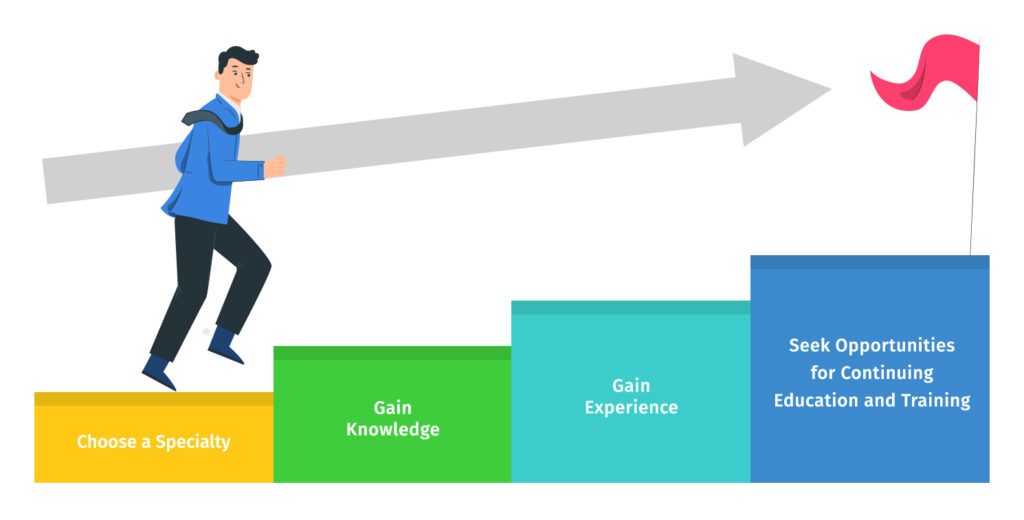Our reviewers evaluate career opinion pieces independently. Learn how we stay transparent, our methodology, and tell us about anything we missed.

A subject matter expert or SME is an expert or authority in a specific field.
In the organizational context, a subject matter expert is an authority on a specific area, practice, process, hardware, software, or technology.
An organization with multiple divisions and departments has several subject matter experts within each division and department.
Here’s a video on the topic if you want to watch it instead. Otherwise, continue reading.
Here are SME examples from different industries and commercial sectors:
Some individuals in organizations do not have a specific title or position but are recognized as SMEs because of their experience.
There are also individuals with titles and positions who are designated as subject matter experts. Examples:
A subject matter expert carries out several critical functions for organizations.
The main function of a subject matter expert in any organization is to promote efficiency.
Let’s take the example of an employee who needs the answer to a question or to understand a complex concept.
One approach the employee can take is to keep trying until they find the answer. This approach does not guarantee the desired result, and even if it succeeds, it consumes time.
Rather than working hard, the employee can consult a subject matter expert. In doing so, the employee will not only get the answer but also learn other relevant aspects of the matter. This second approach has a higher probability of success and requires less effort and time.
Subject matter experts’ analysis helps organizations unearth risks, opportunities, inefficiencies, weaknesses, and strengths. Based on this analysis, organizations improve their strategies and business processes.
In this age of big data, computer programs can analyze data better than humans can. However, professionals design the machines and algorithms they run on. Only subject matter experts can understand if a machine is working as it is supposed to or is generating faulty output due to a misconfiguration.
SMEs work with technical writers to create complex documentation for projects and products.
Subject matter experts are experts in their field. However, they might lack the skills required for communicating with non-technical audiences. They can also lack the skills to work with sophisticated documentation tools and processes.
This is where technical writers come in: they conduct detailed subject matter expert interviews to learn and understand the topics in question and determine what information is relevant.
Technical writers then create documentation that is easy for all audiences to understand. The SMEs then review and edit the documentation.
Subject matter experts communicate relevant specialist knowledge to lay audiences and non-specialists. They serve as guides and mentors for individuals and teams that need support.
Such professionals also communicate relevant knowledge in an accessible way to people higher up in the organizational hierarchy. The CEO, CFO, and board members might struggle to understand technical concepts and their relevance to business and growth. SMEs educate these business experts, answer their queries, and clarify their doubts.
Subject matter experts provide organizations with specific and actionable recommendations to improve their business strategies, processes, and models.
Depending on the organization’s goals, an individual subject matter expert or a team of experts can make recommendations based on their specialized knowledge.
The following are the expert traits:
Expertise is impossible without a breadth and depth of theoretical knowledge in some areas. This is especially true for specialized and research-driven industries.
For example, industries that develop hazardous chemicals need experts who know how to manufacture, store, and transport them. For such industries, a Ph.D. in Chemistry is required to understand the processes required for the development, safe storage, and transport of hazardous chemicals.
Academic education is not a prerequisite for expertise. Especially in information technology (IT), professionals can become subject matter experts without a four-year degree. Relevant certifications and some years of experience give IT professionals the knowledge and skills needed to become SMEs.
Subject matter expertise is often a product of experience rather than formal education.
The business world is focused on results. Any person who works hard can learn through on-the-job experience and training. Over time, such a person acquires relevant experience. This value is due to the acquired ability to get things done. In contrast, an individual with many degrees might not be able to deliver because the individual knows a lot of theory but possesses no skills.
That is why most industries recognize the expertise of someone with long-term knowledge and skills in a given area.
An organization cannot benefit from a subject matter expert who isn’t cooperative. An organization only benefits from a subject matter expert who has a cooperative attitude and is willing to help anyone who needs their expertise.
The most important skills are teamwork, communication, and knowledge management.
Organizations are complex entities. As such, individuals working alone often struggle. That is why teamwork is important.
Professionals work with many people throughout the business and collaborate with a production and a marketing team, if the team needs advice and support.
Communication is one of the most important skills for any employee, regardless of position and work domain.
Subject matter experts must communicate regularly with team members, project teams, sales teams, and key stakeholders. They need excellent written and verbal communication skills.
Knowing “what” and “how” to communicate is as important. The “what” pertains to the idea or information one has to communicate. A person cannot communicate effectively until the “what” is clear. The “how” is the best way of getting the idea across and varies with the context:
The best way to communicate with different individuals varies. For example, an expert’s communication with an entry-level employee differs from that with a director or the CEO.
The best way to communicate with different groups also varies depending on the audience’s interests, level of understanding, and attitudes.
Organizations use different communication tools, such as e-mail, videoconferencing, and other business communication platforms. Knowing the limits of each tool is also essential.
Organizations have their dynamics. The best way to communicate in an organization can only be learned after working in one. That is why experience matters for subject matter experts, not only in the technical aspects of the job.
The definition of knowledge management includes three knowledge types:
Even though subject matter experts possess knowledge, they cannot remember every single piece of information that they will ever need.
Therefore, subject matter experts must use knowledge management principles to protect knowledge – whether tacit, implicit, or explicit – to access and share it when necessary.

You can follow these steps to become a subject matter expert:
The first step is to select your area or niche. The selection can be based on personal interest, market demands, or other factors.
It is best not to make the selection because of an impulse. If you want to become a subject matter expert, you must be sure that your area will stay relevant in the long term.
The best way to develop this long-term perspective is to consult with people who can guide you.
After selecting your area or niche, the next step is to gain knowledge.
Depending on your selection, you can choose a college degree, certifications, or a combination of both.
College degrees offer several benefits and a few drawbacks. The benefits include market value, credibility, and theoretical knowledge. The drawbacks are high costs and long durations.
Certifications offer focused education in a particular area, are economical, and take a few days to a few months to complete. However, certifications lack the credibility and market value of college degrees.
Again, it is best to consult more experienced persons before deciding.
It is almost impossible to become a subject matter expert without relevant experience.
The environment you work in, and the people you work with can make the difference between success and failure. An ideal environment is a cooperative environment where you can ask questions without fear, where people generally want to help, and where you have mentors who guide you.
Again, when deciding where to work and gain experience, consulting with more experienced people is best.
Once you have knowledge and experience in your chosen area, it is best to continue looking for education and training opportunities. Continuous learning and upskilling are essential to keep up with the fast pace of innovation and change.
SME is a go-to person for any specific issue an organization has.
However, this is the age of expertise. For this reason, organizations in the modern economy place a high value on subject matter experts.
Subject matter experts are the go-to people in modern organizations. Whenever an individual or a team has a question, is stuck with a complex issue, or needs expert advice, they consult with unofficial or official subject matter experts.
You can also become a subject matter expert through dedication and hard work.
If you’re interested in learning more about the technical writing skills, roles, and path to landing your dream technical writing job, then check out our Technical Writing Certification Course.
Here are frequently asked questions.
A Subject Matter Expert (SME) is an individual with extensive knowledge and a deep understanding of the field. Due to their significant experience and specialized skills, SMEs are recognized as authorities in their area of expertise. They provide valuable insights and project management, ensuring accurate and effective information and processes related to their niche knowledge. SMEs play a critical role in various industries, including technology, finance, healthcare, and education, where their expertise is crucial for making informed decisions and solving complex problems.
The responsibilities include providing in-depth knowledge and expertise in their particular subject area. They are often tasked with offering advice and guidance on projects, ensuring accuracy and quality of information, and helping to solve complex problems within their field. SMEs collaborate with other professionals to develop and refine processes, products, or services. In software development, for example, an SME might assist in creating detailed requirements, ensuring that the final product meets industry standards and user needs. Their extensive knowledge makes them a key resource for training and mentoring others within the organization.
Becoming an SME involves gaining a deep understanding through education, experience, and continuous learning. Individuals start by obtaining relevant qualifications and gaining practical experience through training materials. Over time, they develop niche knowledge by working on specialized projects, staying updated with industry trends, and participating in professional development opportunities. SMEs are often recognized for their expertise by their peers and organizations, and they may take on roles that require them to share their SME knowledge, such as consulting, training, or leading projects.
SMEs are important in the workplace because they bring an understanding of their particular job. Their expertise ensures project managers and other team members have accurate and up-to-date information, leading to better decision-making and higher-quality outcomes. SMEs play a crucial role in software development, where their specialized knowledge helps create efficient and effective solutions. They also provide training and mentoring, helping other employees develop their skills and knowledge. By leveraging the expertise of SMEs, organizations can achieve greater efficiency, innovation, and competitiveness in their respective industries.
If you are new to technical writing and are looking to break in, we recommend taking our Technical Writing Certification Course, where you will learn the fundamentals of being a technical writer, how to dominate technical writer interviews, and how to stand out as a technical writing candidate.
Stay up to date with the latest technical writing trends.
Get the weekly newsletter keeping 23,000+ technical writers in the loop.









Get our #1 industry rated weekly technical writing reads newsletter.